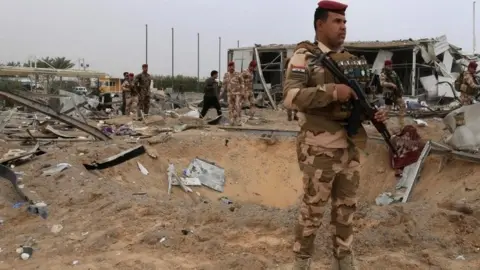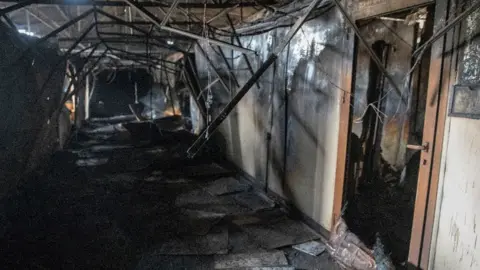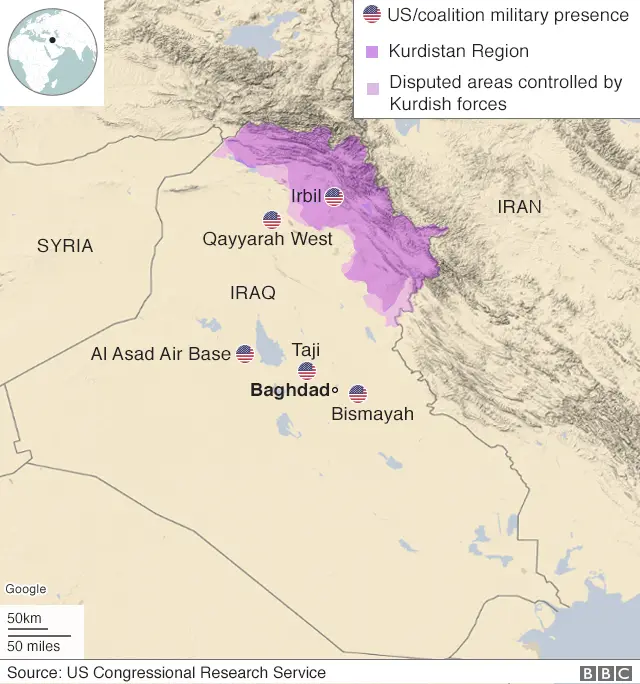Iraq base attack: Coalition and Iraqi troops hurt as Taji targeted again
 AFP
AFPThree service personnel from the US-led coalition in Iraq and two Iraqis have been injured in a rocket attack on a military base north of Baghdad, the coalition has said.
The Iraqi military said more than 30 rockets were fired at Camp Taji base.
This is the second attack this week on the base. On Wednesday, rockets killed two American troops and one British soldier there.
The US responded with air strikes targeting an Iranian-backed militia.
However, Iraqi officials say that Iraqi soldiers and policemen were killed in the strikes.
The Iraqi military says the latest attack on Taji must not be used by the US as a pretext for any action without Iraq's approval.
Taji base, about 15km (nine miles) north of Baghdad, hosts foreign troops from the US-led coalition, whose mission is to train and advise Iraqi security forces.
Iraq's Joint Operation Command said 33 Katyusha rockets were launched on the base. Seven rocket launchers and 24 unused rockets were later found nearby.
No-one has yet said they carried out the attack.
Wednesday's deadly attack on the base prompted US strikes targeting five weapons storage facilities across the country, the US defence department said.
 US Central Command
US Central CommandThe Iraqi military says three soldiers, two policemen and a civilian were killed in the US counter-strikes.
It said the US had carried out "a blatant attack" on Iraqi military sites in Babil province and an airport under construction in Karbala province. It also said the headquarters of the Popular Mobilisation (PM) forces - an umbrella militia which is officially part of the Iraqi security forces - had been hit.
Earlier, a US commander said Kataib Hezbollah - one of the most powerful groups in the PM - was likely to have fired the rockets.
Allow X content?

The US accuses Iran-backed militias of 13 similar attacks on Iraqi bases hosting coalition forces in the past year.
The killing of an American civilian in one such incident in December triggered a round of violence which ultimately led Mr Trump to order the assassination of top Iranian general Qasem Soleimani and Kataib Hezbollah commander Abu Mahdi al-Muhandis the following month.


What's the background?
Tensions between arch-foes the US and Iran intensified last year. In late December, a rocket attack on an Iraqi military base killed a US civilian contractor, prompting retaliatory air strikes.
The US embassy in Baghdad was then attacked by crowds of protesters, and President Trump warned Iran it would "pay a very big price".
On 3 January, Mr Trump authorised a drone strike near Baghdad airport that killed Qasem Soleimani - commander of the Islamic Revolution Guard Corps' Quds Force and architect of Iranian policy in the Middle East - and Abu Mahdi al-Muhandis.
Five days later, Iran launched ballistic missiles at Iraqi bases hosting US forces. The attack left more than 100 US troops with traumatic brain injuries.
There are about 5,000 US personnel and hundreds more from other countries in Iraq. They are deployed at the request of the government but the parliament passed a bill following Soleimani's killing demanding the invitation be rescinded.
